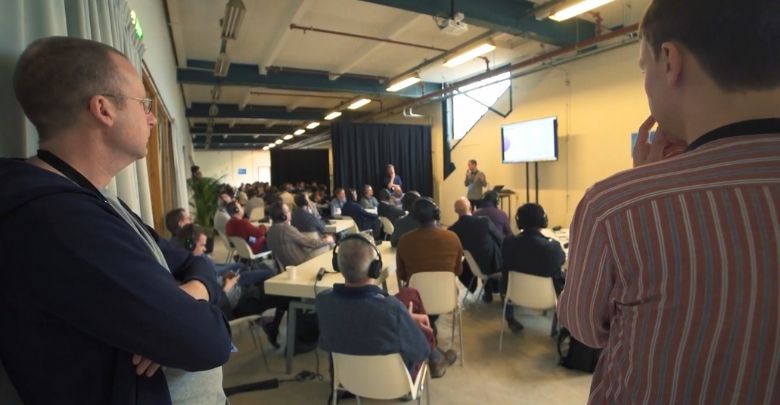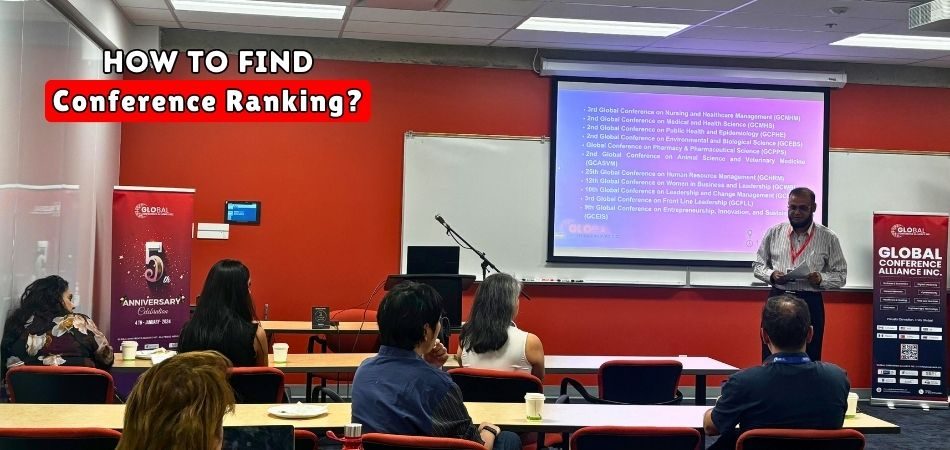There is a lot to consider when choosing a conference. It’s essential to know which conferences hold the most value for your research and professional development. It is important to be able to find conference rankings so that you can make informed decisions about where to invest your time and money. So, how to find conference ranking?
Conference ranking involves evaluating various conferences based on criteria such as their reputation, impact, and relevance to your field. By examining these rankings, you can identify conferences that align with your goals and provide opportunities for networking and collaboration.
In this article, we will explore the importance of conference ranking and provide a comprehensive guide on how to find it. We will discuss the metrics used for ranking, where to find reliable rankings, and the limitations of these rankings. Additionally, we will cover how to use conference rankings for your research and offer tips for selecting the best conferences based on their rankings. This article will equip you with the knowledge to successfully explore the world of conference rankings.
Why Is Conference Ranking Important?
Conference ranking is crucial for several reasons. First, attending well-ranked conferences can significantly increase your professional credibility. When you present your work at a reputable conference, it signals to peers, employers, and funding bodies that your research is of high quality. This can lead to more opportunities, including collaborations and job offers.
Second, conference rankings help you identify which events offer the best networking opportunities, as these rankings reflect the features of good conferences that attract influential professionals and thought leaders. The higher the ranking, the more likely it is that influential professionals and thought leaders will attend. Building connections at these conferences can be invaluable for your career development. Engaging with industry leaders not only expands your network but also enhances your knowledge and visibility in the field.
Lastly, comprehension of conference rankings can guide you in selecting events that align with your research interests. Attending conferences that focus on your area of study allows you to engage in discussions relevant to your work. This focused approach maximizes the value you gain from attending conferences.
How to Find Conference Ranking?
Finding conference rankings doesn’t have to be complicated. With a clear plan, you can easily discover which conferences are reputable and relevant to your research. This step-by-step guide will provide you with simple methods to locate conference rankings effectively. By following these steps, you’ll be better equipped to choose the right conferences that align with your professional goals.
Step 1: Identify Your Research Field
Start by clearly defining your research field. Knowing your area of expertise will help you filter out conferences that are not relevant. Write down specific keywords related to your research interests. This will guide your search for conferences that align with your work. A focused approach will ensure you don’t waste time on irrelevant events. This clarity will also help when communicating your interests to others in your network.
Step 2: Use Trusted Sources
Next, use trusted sources to find conference rankings. Websites such as Conference Alerts, Scopus, and Google Scholar provide information about various conferences and their impact factors. Check if these platforms have a ranking system that categorizes conferences based on credibility and relevance. Using reliable sources will help you gather accurate and current information. Consider bookmarking these sites for quick reference as you continue your research.
Step 3: Research Conference Metrics
Investigate the metrics used to rank conferences. Common metrics include the impact factor, citation index, and the reputation of the organizing institution. Understanding these metrics can give you insights into how conferences are evaluated and help you make informed decisions. Familiarizing yourself with these terms will improve your ability to analyze rankings effectively. This knowledge will empower you to choose conferences that will improve your research visibility.
Step 4: Review Rankings from Academic Journals
Many academic journals publish lists of reputable conferences. These journals often focus on specific fields of study and provide rankings based on previous conferences. Look for announcements in journals related to your research area that highlight upcoming conferences and their credibility. This can also expose you to new conferences that may not be widely advertised. Reading journal articles can also provide context about the importance of attending these events.
Step 5: Consult Professional Associations
Reach out to professional associations related to your field. Many associations compile lists of recommended conferences and provide insights into their reputations. Joining these associations can keep you informed about conferences and their rankings. Being part of these networks can also facilitate further professional connections. Additionally, associations often offer resources and discounts for members to attend selected conferences.
Step 6: Explore Social Media
Utilize social media platforms to find conference rankings. Follow industry leaders and organizations on Twitter, LinkedIn, and Facebook. Often, these platforms will share updates and information about reputable conferences and their rankings. Engaging with the community can also lead to discussions that highlight the importance of certain conferences. Social media can provide real-time updates, helping you stay informed about last-minute changes or announcements.
Step 7: Check Reviews and Testimonials
Look for reviews and testimonials from past attendees of the conferences you are considering. Feedback from peers can provide valuable insights into the quality of the event. Positive reviews can indicate a conference’s credibility and value. Pay attention to both positive and negative feedback to get a balanced perspective. This firsthand information can help set realistic expectations for your experience at the conference.
Step 8: Verify Conference Details
Once you have identified potential conferences, verify their details on their official websites. Check the agenda, speakers, and registration requirements. This information will help you assess whether the conference aligns with your professional goals. Accurate details will ensure that you are well-prepared for what to expect at the event. If possible, reach out to the conference organizers for any additional clarifications you may need.
Step 9: Stay Updated on Rankings
Conference rankings can change over time, so it’s essential to stay updated. Subscribe to newsletters from academic journals, associations, and conference listing websites. Regularly checking for updates can help you stay informed about the latest rankings. This proactive approach ensures that you don’t miss out on new developments in your field. Staying informed will also allow you to adapt your conference choices as your research focus evolves.
What Metrics Are Used to Rank Conferences?
The best conferences can be found through conference rankings. This guide will provide clear steps to conduct your search effectively. With the right approach, you can identify conferences that align with your research interests. Follow these steps to ensure you make informed decisions about attending conferences.
- Impact Factor: The impact factor is a key metric used to evaluate the influence of a conference in its field. It is calculated based on the number of citations received by papers presented at the conference in a given year. A higher impact factor generally indicates that the conference features significant research that is recognized by the academic community.
- Citation Index: The citation index measures how often articles from a conference are cited in other academic works. This metric helps assess the conference’s contribution to ongoing research and discussions. Conferences with high citation indexes often attract well-respected speakers and attendees.
- Organizing Institution: The reputation of the institution organizing the conference plays a crucial role in its ranking. Conferences organized by well-known universities or reputable organizations tend to have higher credibility. Researching the organizing institution can provide valuable insights into the conference’s quality.
- Speaker Quality: The caliber of speakers invited to present at a conference is another important metric. Conferences that feature renowned experts and thought leaders in the field are typically viewed as more credible. A strong lineup of speakers elevates the overall quality of the conference.
- Participant Feedback: Feedback from past attendees is a valuable metric to consider when evaluating conference rankings. Reviews and testimonials can shed light on the quality of the sessions, networking opportunities, and overall experience. Positive feedback can indicate that the conference delivers valuable content and engagement.
Where Can You Find Reliable Conference Rankings?
Finding reliable conference rankings is crucial for making informed decisions about which events to attend. Many academic journals publish lists of reputable conferences in their respective fields. These journals often provide insights into the credibility of the conferences they promote. By checking recent issues of relevant journals, you can find information about upcoming conferences and their rankings.
Websites that specialize in listing conferences, such as Conference Alerts and All Conference Alert, can be helpful resources. These platforms often include rankings and allow you to search by topic and date. Using these websites can save you time and help you find conferences that align with your research interests. Joining professional associations related to your field can keep you informed about important conferences and their rankings. These organizations often have dedicated sections on their websites that list upcoming events and provide insights into their credibility.
Social media platforms can be excellent sources for discovering conference rankings. Following industry leaders and organizations on platforms like Twitter and LinkedIn can provide updates on upcoming events, while you can also search conferences on Facebook to find relevant discussions. Engaging with the community can also lead you to discussions about reputable conferences.
Academic databases like Scopus and Google Scholar may also provide insights into conference rankings. These databases often include metrics that help assess the impact of conferences in various fields. Utilizing these databases can give you a broader knowledge of which conferences are highly regarded.
What Are the Limitations of Conference Rankings?
It is important to be aware that conference rankings are not without limitations. By understanding these limitations, you will be able to select conferences that are right for you. For instance, rankings may not capture the full scope of a conference’s value, such as networking opportunities or specific sessions. Additionally, personal fit is crucial; a highly ranked conference may not align with your research interests or professional goals.
Subjectivity in Rankings
One of the primary limitations of conference rankings is the subjectivity involved in the evaluation process. Different organizations may use varying criteria to assess conferences, leading to discrepancies in rankings. As a result, a conference that ranks high in one list may not necessarily hold the same status in another.
Changing Dynamics
Conference rankings can change over time due to various factors, such as shifts in attendance, changes in organizing bodies, or evolving topics of interest. A conference that was once highly regarded may experience a decline in quality or relevance. It’s essential to stay updated on the latest information to ensure your choices align with current standards.
Limited Scope
Many rankings focus on specific metrics, which may not capture the full picture of a conference’s value. For example, a conference might have a high impact factor but lack engaging networking opportunities. Evaluating conferences based solely on rankings may overlook important aspects that contribute to a valuable experience.
Lack of Personal Fit
A conference’s ranking does not always guarantee that it will be the right fit for you personally. Your research interests, professional goals, and networking needs play a significant role in determining the value of a conference. It’s essential to consider how well a conference aligns with your unique objectives, regardless of its ranking.
How to Use Conference Rankings for Your Research?
Effectively using conference rankings can significantly improve your research experience. By identifying the right conferences, including upcoming conferences in Canada, you can engage with leading experts, gain insights into emerging trends, and strengthen your professional network. This section will provide strategies to help you leverage conference rankings to maximize the value of your attendance. Implementing these approaches will ensure you choose events that align with your research goals and career aspirations.
- Identify Relevant Conferences: Use the rankings to identify conferences that align with your research interests. Focus on events that are highly regarded in your field, as these will likely attract leading experts and valuable discussions. A well-chosen conference can provide insights that directly relate to your work.
- Plan Your Attendance: Once you have identified relevant conferences, plan your attendance carefully. Review the agenda, speaker lineup, and available sessions to maximize your experience. Make a list of keynotes and workshops that you want to attend to ensure you gain the most from the event.
- Network Strategically: Use conference rankings to guide your networking efforts. Attend events known for attracting influential professionals in your field. Approach attendees and speakers based on their reputation, as engaging with recognized experts can lead to valuable connections.
- Follow Up Post-Conference: After attending a ranked conference, follow up with the contacts you made during the event. Send thank-you notes to speakers or individuals you engaged with, expressing appreciation for their insights. This follow-up can help solidify connections and lead to future collaborations.
- Stay Informed: Continue to monitor conference rankings and updates in your field. By staying informed, you can identify new and emerging conferences that may be valuable for your research. Regularly check academic journals and conference listing websites for the latest information.
Frequently Asked Questions
In this FAQ section, we address common questions about conference rankings. These questions aim to provide clarity and help you make informed decisions about which conferences to attend. Whether you are new to conference rankings or looking for specific information, you’ll find useful insights here. We hope these answers improve your perception of the topic.
Why Are Conference Rankings Important?
Conference rankings are important because they help researchers and professionals identify credible and valuable events. High-ranking conferences often attract influential speakers, which can improve the quality of discussions. Additionally, they provide excellent networking opportunities that can lead to collaborations and career advancement. Attending well-ranked conferences can significantly impact your professional growth and visibility.
How Can I Find Conference Rankings?
You can find conference rankings through academic journals, which often publish lists of reputable events. Conference listing websites, such as Conference Alerts and All Conference Alert, also provide information about various conferences and their rankings. Professional associations related to your field frequently have dedicated sections on their websites that highlight upcoming conferences. Utilizing these resources can help you make informed decisions about where to present your work.
What Metrics Are Used in Conference Rankings?
Common metrics used in conference rankings include impact factor, which measures how often conference papers are cited. The citation index is another important metric, providing insights into the conference’s influence in the academic community. Additionally, organizer reputation and speaker quality play significant roles in determining a conference’s ranking. Participant feedback and testimonials can also provide valuable insights into the overall experience at a conference.
What Are the Limitations of Conference Rankings?
Limitations of conference rankings include subjectivity in evaluation, as different organizations may use varying criteria to assess conferences. Changing dynamics over time can also affect rankings, as a once-reputable conference may decline in quality. Furthermore, rankings may have a limited scope, focusing on specific metrics that don’t capture the full experience. Lastly, a conference’s ranking does not guarantee that it will meet your personal or professional needs.
How Can I Use Conference Rankings for My Research?
You can use conference rankings to identify relevant conferences that align with your research interests. Planning your attendance based on these rankings ensures you engage with high-quality events. Networking strategically at these conferences can lead to valuable connections and collaborations. Lastly, staying informed about new and emerging conferences can help you remain active and engaged in your field.
Final Words
In conclusion, learning conference rankings is crucial for making informed decisions about where to invest your time and resources. High-ranking conferences not only offer valuable insights and learning opportunities but also provide the chance to network with influential professionals in your field. By focusing on reputable events, you boost your professional growth and visibility in the academic community.
To answer the question of how to find conference ranking?, start by utilizing resources like academic journals, conference listing websites, and professional associations. These platforms provide credible information that helps you assess various conferences based on important metrics. This approach ensures you choose events that align with your research interests and professional goals.








